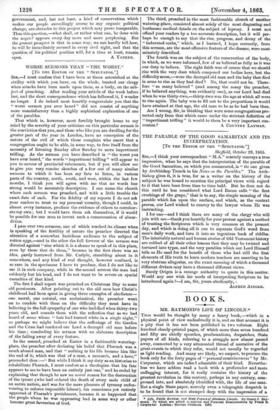THE PARABLE OF THE GOOD SAMARITAN AND ITS INTERPRETATION.
[To THE EDITOR OF THE SPECTATOR."] Sheffield, October 28, 1865. SIR,—I think your correspondent " M.A." scarcely conveys a true impression, when he says that the interpretation of the parable of the Good Samaritan, on which you commented, is " the one given by Archbishop Trench in his Notes on the Parables." The Arch- bishop gives it, it is true, for as a writer on the history of the subject he was bound to mention the principal views with regard to it that have been from time to time held. But he does not do this until he has considered what Lord Bacon calls " the first crushings of the grape," that is to say, the simple meaning of the parable which lies upon the surface, and which, as the context proves, our Lord wished to convey to the lawyer whom He was instructing.
I for one—and I think there are many of the clergy who will join with me—thank you heartily for your protest against a method of treating the Scriptures which is very common at the present day, and which is doing all it can to separate God's word from men's daily work, and turn it into an ingenious book of riddles. The inimitably natural and human stories of Old Testament history are robbed of all their other lessons that they may be twisted and tortured into types, and the very parables which our Lord Himself tells us He used for the benefit of those who had still the first elements of His truth to learn modern teachers are asserting to be very abstruse allegories, on the exact meaning of which a thousand different divines may have a thousand different views.
Surely Origen is a strange authority to quote in this matter. Would any one wish his mode of interpreting Scripture to be introduced again ?—I am, Sir, yours obediently,
ALFRED AINGER.






























 Previous page
Previous page